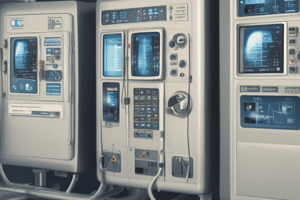Podcast
Questions and Answers
What is one of the primary benefits of using an implanted port for chemotherapy?
What is one of the primary benefits of using an implanted port for chemotherapy?
- It allows for easier access to administer treatment without damaging smaller veins. (correct)
- It eliminates the need for anesthesia during the procedure.
- It provides a permanent solution to venous access.
- It minimizes the risk of infection compared to other methods.
What should a patient notify their doctor about prior to the port placement procedure?
What should a patient notify their doctor about prior to the port placement procedure?
- Plan to resume normal activities after the procedure.
- Family medical history.
- All allergies to medications.
- Any medications taken that could affect bleeding. (correct)
How long should a patient avoid getting their incision site wet after the placement of the port?
How long should a patient avoid getting their incision site wet after the placement of the port?
- 12 hours.
- 24 hours. (correct)
- 48 hours.
- 72 hours.
What signs should prompt a patient to call the doctor after the port placement procedure?
What signs should prompt a patient to call the doctor after the port placement procedure?
How long after the port placement will the surgical glue likely come off on its own?
How long after the port placement will the surgical glue likely come off on its own?
Flashcards are hidden until you start studying
Study Notes
Implanted Port Overview
- An implanted port is a device placed under the skin, linked to a flexible tube that runs to a large vein near the heart.
- It facilitates chemotherapy and biotherapy by providing easy access for treatment.
Advantages of an Implanted Port
- Simplifies IV administration using a special needle designed for the port.
- Minimizes injury to smaller veins in the arm during treatment.
Placement Procedure
- Installation requires a surgeon or interventional radiologist in a controlled setting.
- Initial consultation is necessary for preparation and procedural explanation.
Pre-Procedure Considerations
- Notify medical professional if taking blood thinners, aspirin, or ibuprofen; these may need to be halted beforehand.
- Sedation and localized anesthetic will be administered to enhance comfort during the procedure.
Post-Procedure Care
- Small incisions made during port placement; avoid wetting them for the first 24 hours.
- Showers can resume the day after the procedure, but submerging incisions should be avoided for 7-10 days.
- Surgical glue will naturally detach in 1-2 weeks; do not remove it manually.
- Expect soreness for 2-3 days post-placement; pain management medications should be used as prescribed.
When to Contact a Doctor
- Monitor for fever over 101°F, unusual redness, swelling, drainage, or bleeding from incision sites.
- Seek medical advice for uncontrolled pain or abnormal pain in arms following the procedure.
Maintenance After Healing
- If not accessed regularly for treatments, the port should be flushed every 4-6 weeks by a health care provider.
- When accessed, avoid getting the port wet, especially during showers.
- Use numbing cream prior to access to minimize discomfort; consult healthcare provider for proper use and recommendations.
Studying That Suits You
Use AI to generate personalized quizzes and flashcards to suit your learning preferences.




